Stockwatch: Growth at a fair price for leading technology
This small-cap wants to have its cake and eat it, but has potential to leverage essential technology.
17th January 2020 13:35
by Edmond Jackson from interactive investor
This small-cap wants to have its cake and eat it, but has potential to leverage essential technology.

After six months of consolidation, shares in AIM-listed Beeks Financial Cloud Group (LSE:BKS), the firm involved in cloud computing for automated trading in futures and foreign exchange, have jumped from about 90p to 122p, and currently at 113p.
Has this re-rating been chiefly due to mitigating UK political uncertainties after the general election, or is it signify that Beeks shares are on the cusp of an uptrend?
Followers over the last 15 months or so may be wary given the way Beeks soared from 70p to 135p over August to September 2018, then saw a volatile downtrend until what looks an inflection point coinciding with the election – also various other small caps re-rating. I would try not to lose sight of the key rationale.
Beeks need only modestly mimic Fidessa to deliver a multi-bagger
Despite its small size – market cap is currently around £60 million versus net profit creeping to over £1 million – I’ve drawn attention several times as a speculative, long-term buy, notably in early September 2018 at 80p and again last March at 94p.
I had a sense of déjà vu having followed a company called Royalblue in the 1990’s, re-named Fidessa Group, whose stock always seemed highly rated – but rewarded buyers of its dips. We’re talking very roughly a price/earning (PE) of 30-40x, dropping to nearer 20x, but always at a premium to its earnings growth rate, making it frustrating for a disciplined investor.
As a supplier of specialist IT systems serving financial institutions, Fidessa gained favour with the likes of Lindsell Train fund managers, both to use the technology and own a substantial long-term holding. Train’s kudos was underlined by an eventual £1.5 billion takeover in April 2018, also showing the kind of 20-plus year horizon that may be required to fully capitalise on a multi-bagger. It’s a stretch to assume the same is ahead with an emerging business in “cloud” systems, yet I sense enough parallels to be attuned.

Source: TradingView Past performance is not a guide to future performance
Beeks proclaims a unique self-service portal, enabling clients to build their own infrastructure:
“a rapidly deployed, secure and scalable cloud environment for traders that offers competitive advantage in deployment speeds versus peer products.”
The perennial risks of technology apply: of being surpassed, or some kind of disruption compromising clients, hence its reputation. Yet Fidessa navigated such risks and the cloud is an essential feature of modern business. Beeks “has a foothold in all asset classes of note, meaning we can enter into contract discussions with any financial institution... we are now one of only very few businesses with this breadth globally and are unique in delivering these services via the cloud...”
Valuation appears respectfully – not stratospherically – high
The financial table is early-stage for establishing earning power which is starting to kick in, on a healthy operating margin over 16%, hence a return on capital of 18.6% and on equity of 20.3%. While a market cap around 8x historic sales seems quite rich generally, it’s less so given such ratios.
Consensus forecasts are for net profit to more than double to around £2.2 million in the current financial year to end-June, then rise towards £3 million in 2020/21.
Since earnings per share (EPS) dipped in the 2018/19 year despite profits rising, this sets up an especially strong 80% advance in the current year, such that despite moderating below 30% in respect of 2020/21, when you divided the PE multiple by such growth rates you derive an attractive PEG ratio of 0.6.
That’s taking an approximate 12-month view in between a PE multiple of 28x for the current financial year, reducing to 21x for 2020/21, based on the current stock price of 113p.
Obviously, it’s a snapshot and a tad contrived by last year’s EPS dip; also growth comes easier from a low financial base, and there’s an aspect of capitalising development costs. But, overall, the stock isn’t dear on an earnings view.
Last September’s outlook statement reckoned on “a positive market backdrop, combined with an increased offering and depth of experience within our sales team, means our sales pipeline is considerably larger than ever before...(we are) confident in securing additional Tier 1 customers in the year ahead...(and there has been) a good level of trading in the first two months.”
Contracts and datacentre news affirms guidance
On 20 December, a $1 million (£770,000) annualised contract was signed with a global financial markets technology provider. Beeks is supplying a global deployment of private cloud infrastructure, an arrangement that seems pragmatic if quite diluting Beeks’ prospects directly with institutions. There's also a £1.1 million contract over three years with a cloud-based payments solution provider, this being “a first win in the growing open banking and payments sector, demonstrating the security of Beeks’ offering and applicability to this new segment in financial markets.”
And on 15 January, three new datacentres were declared in Singapore (a second), London (a fourth) and Paris as launching in France. This takes the number from 9 to 15 since Beeks’ 2017 flotation, boosting scope for hosting and connectivity.
As yet, it’s quite hard to see what can go wrong with this narrative unless Beeks’ systems suffer reputational damage, perhaps by cyber attack, or, as the contracts portfolio builds, then revenue timing issues might creep in relative to forecasts, although such a business should be relatively unaffected by the wider economy. Cloud-based IT systems are a required technology transition.
| Beeks Financial Cloud Group | |||||
|---|---|---|---|---|---|
| year ended 30 Jun | 2015 | 2016 | 2017 | 2018 | 2019 |
| Turnover (£ million) | 1.34 | 2.68 | 3.97 | 5.58 | 7.35 |
| Operating margin (%) | 34.5 | 8.4 | -17.0 | 16.1 | 16.2 |
| Operating profit (£m) | 0.46 | 0.23 | -0.67 | 0.90 | 1.19 |
| Net profit (£m) | 0.31 | 0.14 | -0.76 | 0.76 | 1.06 |
| Reported earnings/share (p) | 0.63 | 0.29 | -1.55 | 2.26 | 2.09 |
| Normalised earnings/share (p) | 0.63 | 0.51 | -0.05 | 2.97 | 2.28 |
| Price/earnings multiple (x) | 49.6 | ||||
| Operating cashflow/share (p) | 1.35 | 1.86 | 1.26 | 1.33 | 4.13 |
| Capital expenditure/share (p) | 0.59 | 1.64 | 1.73 | 4.34 | 5.45 |
| Free cashflow/share (p) | 0.76 | 0.22 | -0.47 | -3.00 | -1.32 |
| Dividend per share (p) | 0.30 | 0.35 | |||
| Yield (%) | 0.31 | ||||
| Cash (£m) | 0.07 | 0.03 | 0.02 | 2.89 | 2.34 |
| Net debt (£m) | 0.05 | 0.18 | 0.34 | -2.09 | -1.02 |
| Net assets/share (p) | 0.57 | 0.76 | -0.77 | 9.68 | 11.1 |
| Source: historic Company REFS and company accounts |
Progressive dividend policy is a curiosity
Frankly, I’m surprised they bother with a dividend at all, given investors would in principle value a stock more highly where retained earnings enjoy a return on equity over 20%. Payouts were introduced after flotation and, last September, the full-year dividend edged up from 0.30p to 0.35p a share – the cashflow statement showed at a cost of £254,000 in context of £2.1 million net cash inflow from operations.
However, £435,000 went out in finance lease repayments (slightly down on the previous year) also £152,000 on finance costs (rather high if linked to £699,000 longer-term debt). Beeks’ cash balance was over £2.3 million as a result of the flotation that raised £4.5 million in the end-2017 share placing at 50p (additional to vendors cashing in £2.5 million worth).
So, the company is currently well-financed to pay dividends and the cashflow statement also showed £990,000 was raised by issue of fresh loans, such that financing activities produced a £123,000 net cash inflow.
Meanwhile, the acquisition of trading assets plus payments for property, plant and equipment, absorbed £1.3 million and £437,000 was capitalised as development costs which has boosted profit, rather than be charged to the income statement.
So you could regard the dividend as being paid out the cash reserves or borrowings; it doesn’t represent free cashflow.
The table shows negative free cashflow since the 2017 year, although what’s generated from operations is on a strongly improving trend, so the board might justify its payout policy on the quality of earning power that’s evolving.
Personally, I can’t see why they bother paying out at all, as a £60 million company is very much in an investment/development phase, where the flotation only two years ago was aimed at funding global expansion.
Despite a couple of reservations, is a decent tuckaway
I’m possibly sensitive to listed companies trying to have their cake and eat it; capitalising development costs (not unusual however) and trying to impress with payouts before cashflow matures. Yet potential to leverage essential technology tilts me to favour Beeks long-term. Hold.
Edmond Jackson is a freelance contributor and not a direct employee of interactive investor.
These articles are provided for information purposes only. Occasionally, an opinion about whether to buy or sell a specific investment may be provided by third parties. The content is not intended to be a personal recommendation to buy or sell any financial instrument or product, or to adopt any investment strategy as it is not provided based on an assessment of your investing knowledge and experience, your financial situation or your investment objectives. The value of your investments, and the income derived from them, may go down as well as up. You may not get back all the money that you invest. The investments referred to in this article may not be suitable for all investors, and if in doubt, an investor should seek advice from a qualified investment adviser.
Full performance can be found on the company or index summary page on the interactive investor website. Simply click on the company's or index name highlighted in the article.
Disclosure
We use a combination of fundamental and technical analysis in forming our view as to the valuation and prospects of an investment. Where relevant we have set out those particular matters we think are important in the above article, but further detail can be found here.
Please note that our article on this investment should not be considered to be a regular publication.
Details of all recommendations issued by ii during the previous 12-month period can be found here.
ii adheres to a strict code of conduct. Contributors may hold shares or have other interests in companies included in these portfolios, which could create a conflict of interests. Contributors intending to write about any financial instruments in which they have an interest are required to disclose such interest to ii and in the article itself. ii will at all times consider whether such interest impairs the objectivity of the recommendation.
In addition, individuals involved in the production of investment articles are subject to a personal account dealing restriction, which prevents them from placing a transaction in the specified instrument(s) for a period before and for five working days after such publication. This is to avoid personal interests conflicting with the interests of the recipients of those investment articles.